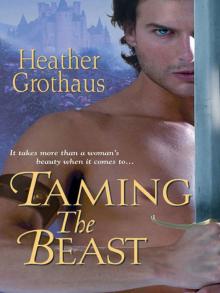- Home
- Heather Grothaus
Adrian Page 3
Adrian Read online
Page 3
Although the news roused Adrian’s interest, he wondered of what import the visitor could truly be. After all, Valentine had pierced Glayer Felsteppe through the heart. He could cause no further damage than what he’d already accomplished before his death.
From where Adrian sat, trapped inside a broken body ruled by a withering mind, it was more than enough.
As if all the men’s thoughts mirrored Adrian’s own, no one prompted the abbot for details or made guesses as to the visitor’s identity, letting Victor take his time.
“The lady-in-waiting to the queen of a small pagan island kingdom off the northern Scots coast,” Victor said in the same measured tone.
“Another woman?” Adrian blurted out and looked up from his page, unable to contain his irritation. Blasted women. Always muddling things with emotion and need and want. Confounding issues with sentiments and frivolous desires. “I do hope this one isn’t looking for an errant husband as well, else I’ll be tempted to believe you’ve sent forth love potions rather than gold, Victor.”
Adrian could feel Valentine’s scowl on the back of his head, and it made him smirk. He raised his cup again.
“It’s actually the island’s king who is missing.”
Adrian snorted. “I knew it. So the queen is the one with the errant husband. Can they not keep track of their men?”
“No, no—the queen’s deposed brother,” Victor corrected. “The royal family experienced a coup of sorts some months ago.” He sounded deeply disturbed. “I am not being clear. Forgive me. I was not expecting such a thing, and it has confused my thoughts.” The abbot took a breath. “Queen Maighread was encouraged to steal the throne by a foreigner, promising her military protection for her home, which has withstood several conquering attempts in history for its rich resources and position as a stronghold. Similar offers had been made to the king for years from various municipalities, but he always refused, choosing to keep his people autonomous from a larger rule.”
“The foreigner, he is English,” Valentine surmised.
“Indeed,” Victor said. “After the queen gained control, her supposed benefactor then changed colors, demanding the sum of the kingdom’s fortune by the time he returns by ship after the seas thaw, else the army that accompanies him will seize control of the island rather than protect it.”
Adrian shut his book in disgust. “I regret that I have little sympathy for this queen thus far. She is reaping what she’s sown. I say tell the maid to return to her queen with the advice that she hand her fortune of peat and goats over to this challenger so that she—and we—may be left out of it.”
“That is the crux of what spurred her maid to flee the island; even if Queen Maighread wished to pay the fortune, no one has been able to locate it thus far.”
“Good for the king,” Adrian muttered. “I only hope he’s gotten himself off to a pleasant, civilized city.”
“The king didn’t take it, Adrian. The fortune is said to be hidden somewhere within the royal castle,” Victor supplied.
“Oh, come now, Victor,” Adrian demanded, at last swiveling in his chair despite his discomfort to address the room. “Said fortune is likely only threepence stuck to the wall with some daub behind a tapestry. This has nothing to do with us.”
Like the sound of an ancient tree creaking from the strain of a mighty wind, Constantine’s voice at last emerged from his hunched posture. “What is this kingdom called, Victor?”
The abbot’s mouth thinned, as if his body wanted to prevent its speaking. “Wyldonna.”
Adrian threw back his head and began to laugh. In truth, it was the perfect answer. “Oh, Father—I’m afraid you’ve been had.”
But Constantine obviously failed to see the humor, as his voice remained raspy and devoid of any mirth. “Victor, Wyldonna is a myth.”
Victor nodded, his thin cheeks growing ruddy. “I have heard the tales myself.”
“Wyldonna?” Valentine repeated.
Roman turned to his friend. “My people called it Valdunna. It is a magical island that no one can find, although if one manages to locate it, they never want to leave. It’s populated by fairies, mystical creatures. Merpeople make their homes there when the seas freeze in winter. Shipwrecked sailors wash up on shore and are never heard from again. My mother often told me I would be stolen off to Valdunna if I strayed too far from home of an evening.” Roman sent the abbot an apologetic glance.
“I see,” Valentine said, sitting back in his chair. Adrian thought the Spaniard also looked sorry for the old abbot.
Instead of sympathy, Adrian felt irritation and disillusionment. Up to this point, he’d thought Victor a man of marked intelligence and cunning, even if he did subscribe to such a thing as religion. Now he couldn’t be sure. “I hope you didn’t tell this woman—who is obviously troubled—that we would assist her in this . . . this . . .” Adrian found himself at a loss for words.
“Goose hunt,” Constantine supplied in an emotionless voice.
Adrian held his cup toward Constantine’s back in salute. “Thank you, yes. Goose hunt.” He drained his cup. A complete waste of the afternoon, although he wouldn’t admit to himself that he’d nothing else to do any matter.
Victor was nodding his head. “I thought the same as you all when I first heard her tale. My only concern was who she had received the Chastellet coin from, because whoever had given it to her had used very poor judgment.” Then the abbot pinned Constantine’s bowed head with his gaze. “Until she told me the name of her blackmailer.”
“No, wait, wait,” Adrian rushed, holding up his right palm. “Allow me to guess: Jack o’ Kent.”
“Adrian,” Constantine chastised in a low tone.
“I wish it was,” Victor whispered to the tabletop. He looked to Valentine for a moment, causing the Spaniard to crease his brow in concern. And then the abbot stretched out his hand and grasped Constantine’s forearm.
“The man threatening Wyldonna is Glayer Felsteppe.”
Chapter 2
The library was tomb silent for several moments as the name of Chastellet’s betrayer and the scourge of the four laymen gathered there sank into the thousands of pages lining the walls and was absorbed, as if the mere mention of it could not withstand the air.
“Glayer Felsteppe is dead,” Valentine said in a quiet voice. “My aim was true. He fell.”
“He survived,” Victor said softly, his kind gaze still regarding Constantine’s bowed head. “It seems as though the troubles you and Lady Mary gave him at Beckham Hall were enough to incur Henry’s irritation. He has taken on the task of securing Wyldonna for the English king in order to repay the wealth loaned to him from your wife’s estate.”
Valentine shook his head. “No. He is dead. He must be.”
“It would not be the first time you had erroneously judged a man to be at the end of his life,” Adrian said sharply, but then felt an uncomfortable welling of regret as the Spaniard dropped his gaze to his hands. It hadn’t been ignorance that prompted Valentine to proclaim Adrian’s impending and inevitable death; by all that was rational and true, Adrian should never have survived the escape from Saladin’s dungeon.
Even though it had fallen to Valentine to carry back the news of the deaths of Constantine’s wife and son years since that hellish time, at least Valentine had been able to assure his friend that he had personally brought an end to the fiend who had committed the atrocity.
Now, Constantine Gerard’s family was still dead, but Glayer Felsteppe lived.
“What does this woman want us to do?” Roman asked hesitantly. “If Felsteppe is not to return to her land until spring, that is a long time to wait.”
“She wishes assistance in locating the Wyldonian fortune,” Victor said, releasing Constantine’s forearm with a sigh. Whatever reaction the abbot had been looking for from the general was not forthcoming. “The queen has no choice but to pay the price Felsteppe demands, else her people will be massacred.”
“Unless we ta
ke care of Glayer Felsteppe once and for all when he returns to collect his spoils,” Roman guessed.
Victor nodded. “That was my thought.”
Adrian had felt the blackness growing in him since hearing Felsteppe’s name spoken aloud. It was taking all his concentration to keep the rage under control.
“What would you have us do, Victor?” he bit out. “Go about some scraggly Scot rock, overturning stones in search of a tiny coin chest?”
“The legend of Wyldonna speaks of a great fortune hidden somewhere within the castle itself, perhaps protected by an enchantment.”
Adrian sighed in disgust and replaced his cup on the sill as he gained his feet. He’d had quite enough. If he listened to much more, his temper would get the better of him.
Victor continued as Adrian shelved the manuscript. “I thought Roman might go, because he is most familiar with the northern hemisphere. Lady Maisie says that the castle itself is something of an enchantment—with rooms that seem to disappear at will, corridors that continue endlessly, hidden trapdoors that lead to inaccessible dungeons.”
“Ridiculous,” Adrian muttered and walked toward the stone doorway.
“Of course I will go,” Roman said from the room behind Adrian. “If I must, I will tear the stones from the walls.”
Adrian came to a halt and spun on the room. “There won’t be any need for that, Roman. It’s simple building design—you of anyone else here should realize that. An interior wall always has something behind it. An inaccessible dungeon must have a ceiling. Corridors lead somewhere, even if it’s to a solid wall. Which, referencing my first point, has something behind it!” He was nearly shouting his arguments now.
“But . . . it’s enchanted,” Victor said.
“I’ll go,” Roman repeated firmly, turning his face toward the abbot. “I know the legends. Perhaps I can—”
Adrian snorted. “Perhaps you can be stung by this paltry queen’s illusions? What will you do when she insists the enchantment requires a blood sacrifice?” He waggled his fingers in the air.
“I’m no fool, Adrian,” Roman said with his formidable brows lowering.
Constantine’s declaration cut into a ready rejoinder that Adrian would later be glad was never spoken.
“I will go.”
All eyes turned to the general, who still regarded the smooth oiled wood of the table.
“If Glayer Felsteppe lives, he owes me a great, great debt. One that is not payable with his pathetic life, but I would take it all the same.”
“If it is even Glayer Felsteppe who threatens this . . . this woman!” Adrian insisted. “Her mythical kingdom could be a hovel outside Edinburgh. Her fantastic fortune a plated spoon one of Felsteppe’s deserters stole from her. It’s a goose hunt. Or a trap.” Adrian paused. “And, forgive me for saying so, but you are in no condition to be placed in a position requiring clear judgment.”
Stan’s head rose, and his deep, pained eyes warned Adrian. “Explain to me why I have not the right to exact my revenge on the man who murdered my son. My little boy, who was not quite six years.”
“I didn’t say you hadn’t the right,” Adrian defended. “Of course you have the right. Nay, above anyone else in this room, you have the responsibility to see that scum wiped from the earth. But Stan, you must see the logic in my argument: your mourning is so deep, so impenetrable—you are not yourself. Just because you want to believe that you will meet Glayer Felsteppe face-to-face and see him dead”—he turned to acknowledge each man in the room—“because you want to believe it, to finish what you started in Beckhamshire; because you want to believe, to save Constantine this suffering; because you want to believe, if only to show that there is something magical about this dreadful, miserable earthly existence.”
Adrian turned back to Constantine. “Does not mean it is so. I do believe that if any can lead us to redemption—regain at least part of what we lost that terrible day at Chastellet—it is you, Stan. But you would put yourself, and us, in danger if you take on this fool’s errand. You have been weakened by your loss. Your mental state is not sound.”
Roman’s gruff voice cut through the tension. “I think you’ve said quite enough, Adrian.”
But Constantine acted as though the Norseman hadn’t spoken. “Weak now, am I, Aid? Not mentally sound, you say?”
Adrian squared his jaw. “From all I have learned of the mind, that is my opinion. Yes.”
“Physician, heal thyself,” Constantine said in a low voice.
Adrian frowned. “This is not about me.”
Valentine leaned forward in his chair, one elbow on the table. “It seems to me that all you have learned of the mind has been through personal experience, yes? Do you no hide yourself away in this very room, day after day, choosing to lose yourself in your precious learning? Do you no limp about, feeling sorry for yourself? At least Stan’s behavior is justified. You are a coward.”
“Yes,” Roman added, warming to the idea the Spaniard was undoubtedly alluding to. “When it is you who has the most knowledge of building, by your own arrogant admission.”
“And,” even Victor seemed eager for the sacrifice, “if we are all such fools for believing in anything that cannot be grasped in the hand, you are the best candidate to take on the task. Surely your superior intellect could not be led astray.”
Every pair of eyes was fixed to him now, and Adrian wondered at their sudden hostility. He’d only been trying to save Constantine’s life by pointing out the obvious. Now they were attacking him.
Adrian looked at them all in turn and realized he was nodding his head. He held out his palms. “You want me to go?”
Constantine’s scowl relented a bit. “You don’t have to go, Adrian.” “No,” Valentine said with a whiff of disgust in his tone. “If Glayer Felsteppe survived my blade, he is unlikely to be bragged to death.”
“Oh, he is capable of tactics more deadly than that, aren’t you, Adrian?” Roman said quietly, and when Adrian met the Norseman’s ice blue eyes he once more saw the splash of blood, heard the clang of swords beneath the hellish cries of attack, smelled the sweat contained within the bowl of Chastellet’s sunbaked walls.
Adrian again felt Roman’s shoulders beneath him as he was carried—more dead than alive—from Saladin’s prison.
“Fine,” Adrian said, holding Roman’s gaze for a heartbeat longer. Then he looked to Victor. “When am I to depart for this imaginary island?”
Victor seemed more than a little surprised. “Within the hour.”
Inside, Adrian paused. He had not expected to leave so soon. Actually, he’d not expected to leave at all. Ever.
“Very well,” he said. He gave the men seated around the table a nod. “I shall gather my things.”
Victor called out to Adrian as he reached the stone slab. “We shall meet you in the courtyard, while the brethren are at their suppers. Lady Maisie’s ship is moored downriver. You should reach it by nightfall.”
“Ship, you say? What a shame. I’d hoped we’d be traveling by unicorn.” Adrian paused with his hand on the latch and spoke over his shoulder. “Don’t bother with seeing me off. I’ve little use for sentimental farewells when I’m being exiled.”
Then he swung the door open and escaped into the black vortex of the stairwell.
Maisie Lindsey paced back and forth between two tall, winged angels in the courtyard of the abbey, her boots crunching on the gravel, made louder by the snow packed between the stones. The hood of her black cape was drawn up, doing much to shield her ears and the sides of her face from the biting wind swirling up off the Danube, and yet each time she spun on her heel to change directions, she caught sight of the stone eyes of the statues, staring at her reproachfully.
“Stop it,” she muttered up at the one currently before her as she turned her back.
Crunch, crunch, crunch. The layers of her rose- and cream-colored skirts flaring out in front of her with each step.
What was taking him so long? She
prepared to turn again, and saw the disappointed moue of yet another angel.
“Stop,” she gritted out through her teeth. “I doona have any choice, do I?”
The hollowed stone pupils twitched forward with a little sandy whisper to regard the winter-stilled courtyard once more.
Maisie heaved a great sigh and turned to continue her pacing.
Then she saw the lone figure emerging from between the columned archways, his telltale monk’s robes kicking up above the gravel path. He walked with a limp.
“Oh, good,” she mumbled. “He’s crippled.” She noticed the man regarded her openly as he approached. Stared at her, actually, and his impertinence caused her to bristle.
She glanced up at the statue next to her and then glared at it until even the great angel had to avert his gaze.
The monk reached her at last, his hooded brown eyes appraising her suspiciously. He could have at least shaved. Maisie mustered a thin smile and tried to enunciate her words clearly. “Good day. Do you speak any English?”
One of the monk’s eyebrows rose. “I do. Would you care for me to teach it to you?”
Maisie frowned; his accent was clearly of the far southern island. “I thought you were Norse.”
“Do I look Norse?”
Now it was Maisie’s turn to raise an eyebrow. “Nay. Actually you look a bit of a weasel, so I couldna be certain. You’re quite rude for having just met a lady.”
“Forgive me; I assumed the qualifier of your title ‘in-waiting’ absolved me of the burden of chivalry until a later time. And you did just refer to me as a weasel.”
“I didna. I only said you had the look of a weasel. Whether you actually are one or nae remains to be seen.”
“What exactly is that supposed to mean?”
She cocked her head and the wind chose that moment to reach inside her hood and pull forth a ringlet of her red curls. “Are you certain you speak English?”
He gave her a ghost of a smile, then. “Adrian Hailsworth.”
“Lady Maisie Lindsey.”
“Quite a musical name. Where are the horses, Maisie Lindsey?”

 The Highlander's Promise
The Highlander's Promise The Laird's Vow
The Laird's Vow The Scot's Oath
The Scot's Oath Taming The Beast
Taming The Beast Never Seduce A Scoundrel
Never Seduce A Scoundrel Roman
Roman Never Love a Lord
Never Love a Lord Never Love a Lord (Foxe Sisters)
Never Love a Lord (Foxe Sisters) Valentine
Valentine Adrian
Adrian Constantine
Constantine Never Kiss A Stranger
Never Kiss A Stranger